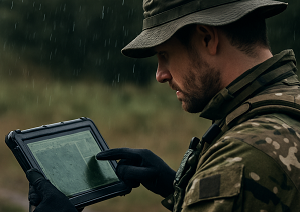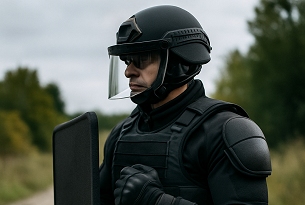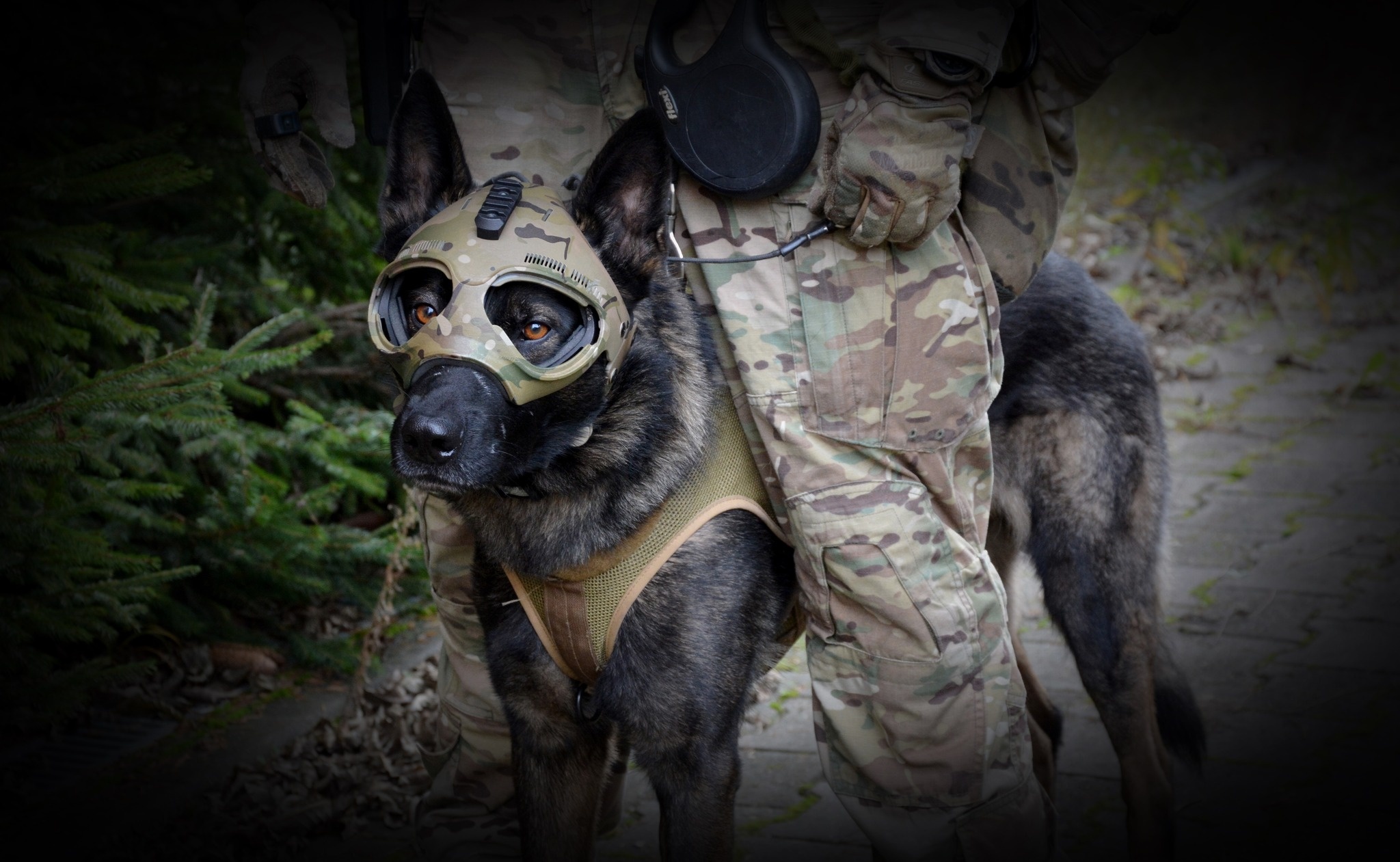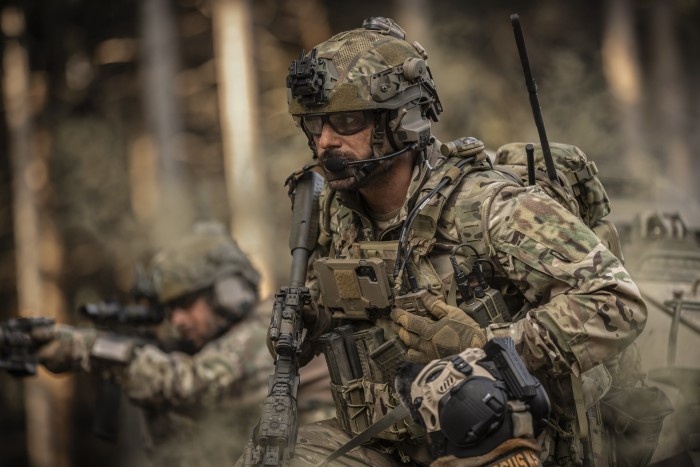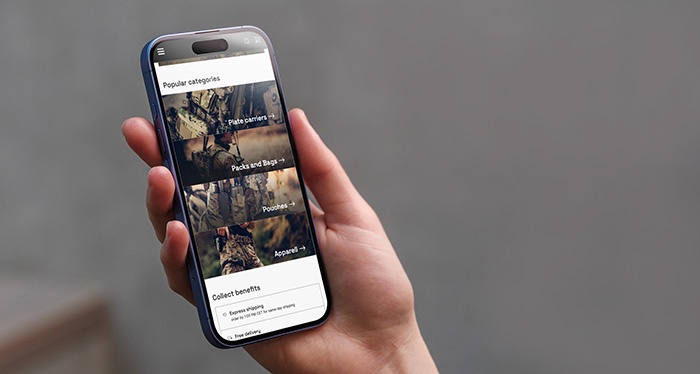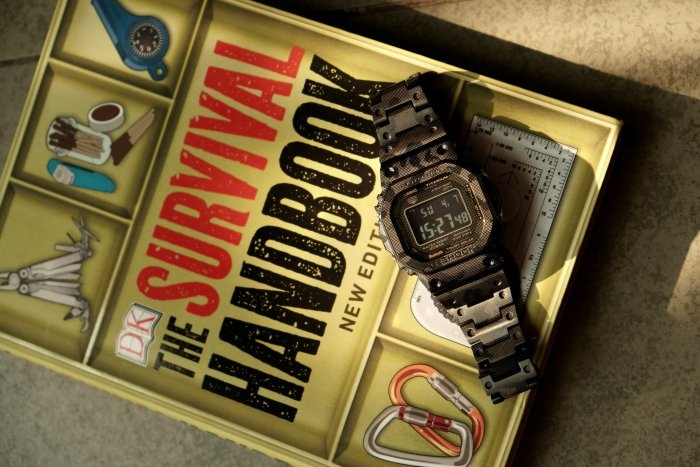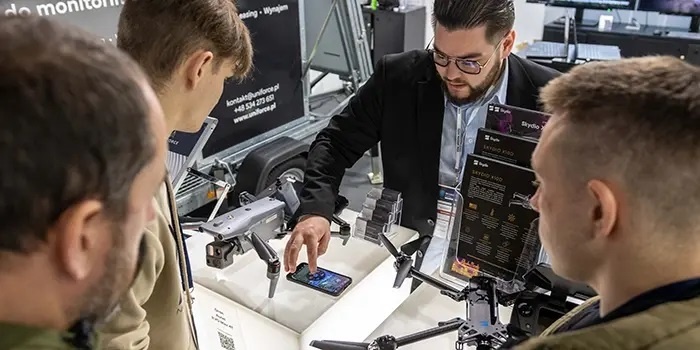Każdy weteran jest inny, nie można wszystkim po prostu przepisywać leków!
Every veteran is different, you can’t just throw medications at them!

W ogromnej większości są weteranami z Navy SEALs. I podobnie, jak w przypadku Fundacji SPRZYMIERZENI z GROM, z którą podpisali porozumienie o współpracy, pomagają innym mundurowym w walce o powrót do normalnego życia po tym, co przeszli. Działają na rzecz zwiększenia społecznej świadomości, czym jest PTSD i TBI oraz nie są to zjawiska dotyczące tylko wojskowych. Starają się również, by przepisywane „z automatu” leki zastąpiono pełnym zrozumieniem przypadku każdego poszkodowanego żołnierza, z rozważeniem innych metod leczenia. O swojej pracy opowiadają Rachel Dzieran – prezes Navy SEALs Fund – Brotherhood Beyond Battlefield oraz działający w fundacji Thomas Drago i Wayne Standel, byli „specjalsi” z Navy SEALs.
In great majority, they are veterans of the Navy SEALs. And just like in case of the Allies of GROM Foundation they’ve just signed the cooperation agreement with, they help other military service-members in their fight to return to normal life after what they’ve been through. They act to increase the social awareness in terms what the PTSD and TBI really are, and the fact that they don’t concern only the military. They also do their best to change the freely-prescribed medications into the full understanding of each single case of a traumatized soldier, with consideration of other treatment options. Here, you will find their everyday work described by Rachel Dzieran – the president of the Navy SEALS Fund – Brotherhood Beyond Battlefield, and Thomas Drago and Wayne Standel – both former Navy SEALs operators, working in the Foundation.
SPECIAL OPS: Na podstawie waszych doświadczeń we współpracy z GROM-em czy z Fundacją SPRZYMIERZENI z GROM, czy możecie wskazać główne różnice między amerykańskimi a polskimi weteranami, charakterystyczne dla ich jednostek?
WAYNE: Jeśli chodzi o możliwości, operatorzy GROM-u są w stanie wykonywać najtrudniejsze zadania, a z tego, co widziałem i słyszałem, a co DRAGO zapewne potwierdzi, są bardzo profesjonalni we współpracy z innymi jednostkami, co nie zawsze akurat jest regułą, a więc doskonale uzupełniają proces realizacji zadania.
Myślę też, że kolejną istotną różnicą w kwestii TBI czy PTSD, jest to, iż bardziej są narażeni na niebezpieczeństwa. Przez ostatnie 15 lat każdy z nas brał udział w misjach, ale mamy częstszy system rotacji, więc kiedy ja już swoje odsłużę i zrobię to, co do mnie należało, na moje miejsce wchodzi inny odział, który kontynuuje moją pracę. Mam trochę przestrzeni. GROM również ma swój system rotacyjny, ale ponieważ żołnierzy tej jednostki jest mniej niż operatorów Navy SEALs, GROM-owcy biorą udział w misjach znacznie częściej i przez dłuży okres czasu. To znaczy, że operacyjnie są potrzebni na dłużej, z krótszymi i rzadszymi przerwami. Przenoszą się z miejsca na miejsce i ten podtrzymujący się cykl bojowy z wystawieniem na wszystkie jego szkodliwe czynniki może mieć znacznie gorszy efekt na nich niż na nas. Zgodzicie się ze mną?
DRAGO: Tak, zdecydowanie, szczerze podziwiam tych ludzi – ryzykują życie, biorą udział w misjach bardzo często, jak powiedział Wayne, bo jest ich po prostu mniej, ale nadal czują się w obowiązku zakończyć zadanie, niezależnie od tego, ile czasu będą musieli temu poświęcić i ile czasu będą mogli potem odpocząć, jeśli w ogóle.
SPECIAL OPS: Gdy rozpoczęliście współpracę z Fundacją SPRZYMIERZENI z GROM, czy coś was zaskoczyło lub czy natrafiliście na coś, co bylibyście gotowi wypróbować w waszej organizacji?
DRAGO: Najważniejszą rzeczą dla nas, z czego zdaliśmy sobie sprawę, że moglibyśmy to usprawnić u siebie, było sympozjum, wymiana wiedzy między lekarzami na temat leczenia TBI i PTSD w przypadku weteranów. Sympozjum było pomysłem Fundacji SPRZYMIERZENI z GROM i to było coś fantastycznego, że nasi lekarze mogą przyłączyć się i współpracować z polskimi lekarzami, nawzajem uczyć się od siebie. To jest jedna strona.
Dowiedz się więcej: Międzynarodowe Sympozjum PTSD i TBI – gdy po wielkiej bitwie opadnie kurz, ale nie emocje…
Druga strona to świadomość dotycząca TBI i PTSD wśród władz w Polsce. Nie widziałem szczególnego zainteresowania ani zaangażowania we właściwy proces rehabilitacji w przypadku TBI czy PTSD ani też zrozumienia dla problemu. Szokującym dla mnie była fakt, iż Fundacja SPRZYMIERZENI z GROM musi walczy o rzeczy, które u nas obowiązują już od dawna i są czymś zupełnie naturalnym. To, co powinno zostać wdrożone i co Fundacja stara się osiągnąć, to właściwe procedury, poprawne z prawnego punktu widzenia, obowiązujące wszystkich mundurowych, którzy wymagają rehabilitacji lub innego rodzaju leczenia. W każdym razie wierzę w to, że działając razem jesteśmy w stanie osiągnąć wiele dla obu stron.
SPECIAL OPS: A jak wygląda kwestia świadomości odnośnie TBI I PTSD w amerykańskim społeczeństwie, wśród waszych władz? Podobnie jak w Stanach, gdzie akcja ta została wymyślona, my również mieliśmy swoją kampanię „Pompka dla Weterana”. Ale jak powiedział Grzegorz, nie miała ona właściwego efektu, ponieważ komunikowała, iż PTSD czy TBI to przypadłość jedynie żołnierzy, podczas gdy problem dotyczy wszystkich z traumatycznymi przeżyciami.
DRAGO: W rzeczywistości PTSD dotyka faktycznie w większym stopniu cywili niż wojskowych. Problem i jego specyfika nie są tak dobrze znane, jak byśmy tego chcieli, ale w USA powoli się to zmienia i społeczna świadomość odnośnie tego, że PTSD dotyczy wszystkich dziedzin życia, powoli się powiększa.
Wielu ludzi jest narażonych na ten syndrom: wojskowi, policjanci, ratownicy pogotowia, strażacy i cywile – poprzez przeżyte traumy – fizyczne i psychiczne. Efekt będzie podobny lub taki sam, niezależnie od tego, kim się jest: żołnierzem, gliniarzem czy zwykłym gościem. To jest rodzaj „obrażenia”, które każdy może odnieść.
Z drugiej strony, ta “stygmatyzacja” nie jest tak silna w Stanach, także dlatego, że ludzie tacy, jak Wayne czy ja możemy mówić bardzo otwarcie o naszych problemach i o tym, jak sobie z nimi poradziliśmy. To samo powoli zaczyna dziać się w Polsce i w tym chcielibyśmy pomóc, zwłaszcza w przypadku polskich weteranów, to znaczy mówić o tym, że problem istnieje, ale że nie dotyczy tylko wojskowych.
WAYNE: Ta “wojskowa stygmatyzacja”, fakt, że ktoś może wrócić z misji z PTSD – musimy tu podkreślić fakt, iż nie jest to już nawet PTSD, ale PTS - Post-Traumatic Stress. I że nie jest to jedynie PTS o podłożu bojowym czy wojskowym w jakikolwiek sposób. Nie tylko. PTS może być skutkiem każdego traumatycznego doświadczenia. Osobiście byłem świadkiem tego, że najtrudniejszy przypadek PTS nie dotyczył żołnierza, a żony, której mąż zginął na misji. To samo w sobie było dla niej tak trudne i traumatyczne, że chyba nawet do dzisiaj do końca z tego nie wyszła. Ludzie mają tendencję do tego, że nie widzą całego problemu, jego pełnego spektrum – jak trauma odbija się na rodzinie, na dzieciach, które wychowują się i dorastają bez ojca. Ale tego typu problem znów jest zwykłe kojarzony z wojskiem, a jednocześnie przecież może dotyczyć kogoś, kto wychowywał się w patologicznym domu, przez długi czas był ofiarą przemocy ze strony rodziców, co wpłynęło na niego lub na nią psychicznie i fizycznie.
Sprawdź szczegóły: Polsko-amerykańska współpraca dla weteranów
SPECIAL OPS: Rozumiem więc, że to co robicie w ramach Navy SEALs Fund to przede wszystkim patrzycie na całość problemu i każdy element z tego “obrazka” bierzecie pod uwagę przygotowując terapię, która zakłada także pracę z rodzinami lub kimś bliskim dla weterana, który lub która też może odczuć efekt tego, przez co weteran przeszedł.
RACHEL: W naszej fundacji, Navy SEALs Fund, pracujemy z najbliższymi rodzinami poległych, o których często się zapomina. Zapewniamy wsparcie charytatywne dla całej rodziny. Skupiamy się na małej społeczności, by móc reagować szybciej, aby rodzina jak najwięcej mogła dowiedzieć się o leczeniu. My też, jako fundacja, uczymy się, bo widzimy mechanizmy, nowe przypadki i natychmiast na nie reagujemy. Więc jeśli pomagamy jakiemuś weteranowi, który przechodzi terapię w centrum, wówczas zapewniamy specjalny program edukacyjny dla rodziny. Innymi słowy: chodzi nie tylko o jedną osobę. Efektem jest to, że świadomość o TBI czy PTSD wzrasta, ludzie widzą, jak złożony jest to problem, jak jest powiązany z innymi aspektami życia, a więc ta „stygmatyzacja” ulega zmniejszeniu. I jest to zupełnie naturalne, że człowiek po doświadczeniu pewnych rzeczy ma objawy PTSD czy TBI.
SPECIAL OPS: Wiem, że każdy przypadek TBI czy PTSD jest inny, ale z czym w największym stopniu weterani zmagają się w Stanach? Czy jest to na przykład problem ze znalezieniem pracy?
DRAGO: Nie uważam, by stanowiło to szczególny problem dla weteranów z uwagi na niskie zainteresowanie zatrudnieniem ich przez potencjalnych pracodawców. Wydaje mi się, że jest raczej na odwrót. Zarówno rząd, jak i społeczeństwo, bardzo nas wspierają. Oczywiście, mogą zdarzyć się jakieś braki administracyjne, jak wszędzie, ale problem nie leży w pracodawcach. Nie ma złej woli czy braku chęci z ich strony.
Chociaż może być tak, że weteran cierpiący na TBI czy PTS, poszukujący pracy, ma pewne ograniczenia wynikające z urazów, które stanowią przeszkodę w wykonywaniu pewnych zawodów, czego przykładem jestem ja sam. Jestem programistą, ale mam problemy z przeczytaniem paragrafu i zapamiętaniem tego, co przeczytałem, więc muszę czytać kilka razy, a bez terapii moje życie z pewnością byłoby trudniejsze, biorąc pod uwagę pamięć i równowagę.
Może więc istnieć pewien problem polegający na tym, że weteran ma jakieś niezwalczone objawy TBI, które uniemożliwiają mu wykonywanie pewnych prac, ale nie jest to kwestia tego, że nie może znaleźć żadnej pracy lub że jedyne zajęcia, jakie mu pozostają, to te o najniższej płacy.
Polecamy lekturę: "Weterani nie szukają współczucia, chcą tylko dalej normalnie żyć" / "They aren’t looking for sympathy, they are looking to continue living"
SPECIAL OPS: Skoro rozmawiamy o zatrudnianiu weteranów, to nie wiem, czy jest wam znany ten temat, ale pewna firma, założona również przez weterana, Black Rifle Coffee Company, wyzwała Starbucks to zatrudnienia 10.000 weteranów… Czy takie akcje często się zdarzają?
DRAGO: Chciałbym coś tutaj zaznaczyć. Jako weteran, odmawiamy picia kawy w sieci Starbucks. To byłby dla mnie wstyd, jeśli ktoś z mojej rodziny piłby tę ich kawę. Nie chodzi o to, że nie zatrudniają weteranów, bo zatrudniają, ale o ich polityczne deklaracje. Zarząd firmy krytykował politykę naszego prezydenta. W mojej opinii, to hańba. I wszystkim odradzam picia ich kawy. Znajdźcie inną sieć, inne miejsce. Poza sprawami związanymi z polityką, ich kawa jest zwyczajnie kwaśna, niedobra, po prostu ma fatalny smak.
SPECIAL OPS: Pojawiły się pogłoski jakoby Starbucks odmówił wysłania kawy żołnierzom Piechoty Morskiej służącym w Iraku, o którą prosili w liście, a firma swoją decyzję odmowną usprawiedliwiła tym, że nie mogą tego zrobić, gdyż nie popierają wojny ani obecności wojsk USA na Bliskim Wschodzie.
DRAGO: Sam doświadczyłem takiego traktowania. Poszedłem do Starbucksa i potraktowano mnie źle jako kogoś, z kim nie chcieli być kojarzeni. Poznali, że jestem weteranem i że popieram naszego prezydenta. Oczywiście, nie powiedzieli wprost, że nie będą zatrudniać weteranów, bo zatrudniają ich, ale używają ich również w działaniach wobec innych wojskowych. A sprawa dotyczy tym samym żołnierzy z innych krajów, którzy walczą ramię w ramię z Amerykanami, więc także i Polaków.
SPECIAL OPS: Wracając do samej terapii. Środowisko pola bitwy, jak i same metody walki zmieniają się, ewoluują, sposoby leczenia również – czy prowadzicie eksperymenty z nowymi kuracjami, np. używając niestandardowych metod, łącząc bezpańskie psy z weteranami, którym komunikacja z drugim człowiekiem przychodzi bardzo ciężko?
WAYNE: Moim zdaniem powinniśmy odchodzić od leczenia weteranów tylko poprzez przepisywanie im kolejnych leków, które jedynie maskują symptomy PTS lub TBI. A to właśnie jest pierwszym wybieranym sposobem. Wypisanie recepty na fiolkę antydepresantów to pójście po linii najmniejszego oporu, co de facto zamienia jeden problem na drugi, nie lecząc tak naprawdę niczego, a jedynie maskując. Powinniśmy więc bacznie obserwować, jak się zmieniamy, ewoluujemy, i poznawać dokładnie ludzi, którzy przeszli przez traumatyczne wydarzenia, mieli trudne doświadczenia lub doznali uszczerbku na zdrowiu w wyniku wstrząsu, bez względu na to, czy działo się to w wojsku czy nie. Musimy szukać nowych, bardziej holistycznych metod leczenia np. pracując ze zwierzętami.
Tutaj mogę co nieco opowiedzieć o moich doświadczeniach, jako że współpracowałem z organizacją “Psy weteranom”, gdzie łączono weterana z PTS lub TBI i uratowane przed bezdomnością zwierzę. Przez rok ta dwójka razem się szkoliła, na zasadzie modelu relacji „właściciel-trener”, gdzie weteran był mocno zaangażowany w szkolenie i wychowanie psa.
Terapia była częścią tego procesu szkolenia, a efektem było stworzenie silnych więzów miedzy psami a weteranami. Na koniec, weteran otrzymuje psa, którego wychowywał – jest mu on niejako przypisany jako „pies służbowy”, z którym może on chodzić wszędzie – może z nim legalnie wejść na lotnisko, do hotelu, bez żadnych ograniczeń – tu, gdzie pojawia się ta więź, tu jest właśnie terapia.
Inne metody – masaże, akupunktura – wypróbowując je nie można nimi nikogo skrzywdzić, a można w ten sposób znaleźć odpowiedni zestaw dla konkretnego weterana. Przepisywanie masowe leków, o działaniu podobnym do narkotyków, to tylko tworzenie kolejnego problemu – uzależnienia. A to ogromny ciężar dla ludzi wokół. Pragniemy zapewniać terapię, która podnosi poziom życia weterana, ale również jakość tego życia dla wszystkich w pobliżu, dla najbliższych, rodziny, dzieci – tak, by stał się on lub by stała się ona znów produktywną częścią społeczeństwa.
Pytałeś wcześniej o problem z zatrudnieniem dla weteranów. Dla tych, którzy pracę oferują, weteran z definicji jest bezinteresownym, gotowym do służby i pracy, inteligentnym i pracowitym, doświadczonym człowiekiem z etyką zawodową. Weterani są cennym zasobem ludzkim i tak powinno się na nich patrzeć, a nie jak na kogoś, komu powinno się wyświadczyć przysługę. Jeśli uda nam się ich przywrócić do zdrowia, zatrudnienie weterana przyniesie korzyści i jemu samemu , i firmie, bo otrzyma ona wysokiej jakości i „dużego kalibru”, zaangażowanego, gotowego do wykonywania zadań, pracownika, który zdziała wiele dobrego dla firmy.
Zobacz także: Honor. Oto, co wyróżnia polskich specjalsów
SPECIAL OPS: Czy weterani wolą próbować czegoś nowego czy raczej podejmują się tego, co jest ściśle związane z ich doświadczeniem wojskowym? Np. pracując jako instruktor strzelectwa, ochroniarz, kontraktor?
DRAGO: To zależy od indywidualnych preferencji. Niektórzy wolą dalej w tym działać, inni nie. Nie lubię tylko sytuacji, kiedy ktoś jest zmuszony do robienia tego, czego tak naprawdę nie chce, bo nie jest w stanie znaleźć innej roboty, więc gdy powoli kończą się pieniądze, zgłasza się na kolejną turę w organizacji paramilitarnej i historia powtarza się bez końca – to ogromny ciężar zarówno dla rodziny, jak i dla tego weterana.
Naszym zadaniem jest pomóc weteranom wydostać się z tego kręgu, z tego błędnego koła, w którym nie chcą być, pomóc im znaleźć nową pracę, która pozwoli im spróbować czegoś nowego, przekwalifikować czy zdobyć nowe umiejętności. Z drugiej strony, doświadczenie wojskowe zawsze przydaje się w cywilnym życiu, jako że pewne cechy profitują w sferach zawodowych. Weteran, który odniesie sukces w terapii, odniesie go także w pracy – jako pracownik lub właściciel własnej firmy.
WAYNE: Częścią działalności naszej organizacji, którą istnieje już od kilku lat, prócz programu z psami, jest także program odnowy dotyczący również zatrudnienia. Z tego, co widziałem, gdy weterani kończą terapię i idą do pracy, pracodawca, który zdecydował się ich zatrudnić, bardzo często dzwoni do nas pyta „Nie macie jeszcze paru wolnych chłopaków? Bo ci, których zatrudniłem, to moi najlepsi pracownicy, pną się po szczeblach kariery w szeregach mojej firmy.”. To wyzwanie, ale ludzie nie boją się go podjąć.
RACHEL: Istnieją pewne ograniczenia co do tego, co weteran może otrzymać od rządu lub w ramach państwowej opieki medycznej i właśnie tam, gdzie zaczynają się ograniczenia, wchodzimy my i nasza Fundacja, wypełniamy luki, szukamy alternatyw, przeprowadzamy research, by znaleźć nowe metody leczenia, by faktycznie pomóc zamiast polegać tylko na lekach, na których z kolei w największym stopniu skupia się państwowa służba zdrowia.
Nasze porozumienie z Fundacją SPRZYMIERZENI z GROM to także krok naprzód w tzw. „robieniu prawdziwej różnicy” poprzez uczenie się nowych rzeczy, które możemy wykorzystać w naszej działalności. Polega ona także na budowaniu świadomości, skąd czerpać środki na działalność charytatywną, na których polega Fundacja, jak zdobyć wsparcie społeczeństwa, które zaczyna się od słów „Dziękujemy za waszą służbę!” „To dla nas zaszczyt móc was poznać, tyle dla nas zrobiliście!”. Następnie pojawiają się pytania: „Co możemy zrobić, by pomóc weteranom?”. Są różne sposoby i wspaniałe opcje, np. związane z edukacją, które pozwala potem zdobyć lepszą pracę.
Przeczytaj również: Brytyjscy weterani w obiektywie Bryana Adamsa – wystawa WOUNDED w Polsce
Pracujemy z Navy SEALs i GROM-em, bo wiele przeszli. Byłam w lotnictwie, wiec miałam czas na skończenie studiów i rozwój zawodowy oraz różnych umiejętności, które przydały mi się po wyjściu z wojska. A ci ludzie nie mają tego czasu, nie mają luksusu wzięcia wolnego. Zatem oferujemy im różne rozwiązania, by mogli żyć normalnie po zakończeniu służby. Stawiamy na kreatywność w tym, co robimy, jak ich wspieramy, dysponując posiadanymi funduszami i zaangażowaniem społecznym, ale najsilniejszym czynnikiem jest tu fakt, iż naszą organizację, podobnie jak Fundację SPRZYMIERZENI z GROM, tworzą żołnierze jednostki – przeszli podobne rzeczy, więc wiedzą, z czym się mierzą i o co w tym wszystkim chodzi – to niezwykle istotny fakt, że dla weteranów pracują inni weterani.
SPECIAL OPS: To rodzaj więzi, zrozumienia między żołnierzami, którzy świadomi są podstaw tego, co powinno być zrobione, by mogli sobie pomóc, bo wszyscy “tam byli”.
RACHEL: Dokładnie.
DRAGO: Chciałbym tu dodać, że nie mówimy, że leki są złe. Chodzi nam o to, że istnieją alternatywne formy leczenia i dużo zależy od lekarza i jego decyzji, zaś ta od świadomości innych opcji, by wybrać mądrze, czy tabletki są faktycznie potrzebne i czy konieczne trzeba je przypisywać.
WAYNE: Oczywiście, w lekach jest spory potencjał na wielu poziomach. Według mnie, jednak, kiedy jest to możliwe, starannie dopasowany zestaw leków, wybrany i przepisany przez w pełni świadomego lekarza, powinien być stosowany wespół z alternatywnymi metodami. A moja opinia bierze się z moich własnych obserwacji i historii dotyczących weteranów, którzy cierpieli z powodu przyjmowania w ogromnych ilościach leków.
DRAGO: To także moje doświadczenia. Nie jestem lekarzem, ale widziałem efekty beztroskiego przepisywania leków bez rozważenia innych opcji. Skutki były straszne i nie chciałbym być świadkiem przechodzenia przez coś takiego przez moich znajomych weteranów. Wystarczająco dużo już przeżyli.
RACHEL: Musimy pamiętać, że każdy weteran jest inny, każdy też inaczej reaguje. Niektórzy potrzebują delikatnego wsparcia lekami, inni czegoś więcej, co powinno być dokładnie sprawdzone. Istnieją też przypadki weteranów, którzy nie zgłoszą się po pomoc, nawet jeśli jej potrzebują, bo będą obawiali się skutków terapii bazującej na lekach – nie przyjdą ze strachu, że skończą z uzależnieniem i będą mieli jeszcze więcej problemów, podobnie jak ich koledzy.
Solidna edukacja i zwiększanie świadomości są bardzo ważne. W Navy SEALs Fund pracujemy z lekarzami, specjalistami w różnych dziedzinach – razem tworzymy zespół, bo problem PTS i TBI jest bardzo złożony i powinien być rozważany za każdym razem z różnych punktów widzenia, a także konsultowany z ekspertami, by dostrzec wszystkie możliwe opcje. Wspomniałeś o uzależnieniu, które pojawia się przy nadużywaniu leków – w Stanach trwa obecnie spora kampania przeciwko zbyt dużemu stosowaniu środków przeciwbólowych, które mogą prowadzić nawet do uzależnienia od heroiny. Staramy się więc działać na rzecz zmniejszenia liczby przepisywanych weteranom leków tego typu, aby uniknąć takiego ryzyka. I powiem to jeszcze raz – każdy przypadek weterana z TBI czy PTS musi być w pełni rozpoznany, omówiony w zakresie dostępnych opcji i zrozumiany najlepiej jak to możliwe, aby następnie ten weteran mógł być poddany terapii, będącej najlepszą kombinacją dostępnych metod.
SPECIAL OPS: Dziękujemy za rozmowę.
English version / Wersja Angielska
SPECIAL OPS: Based on what you’ve seen during your cooperation with either GROM or the GROM Foundation, can you point our any specific differences between the US and Polish SOF and veterans, characteristic for the particular unit?
WAYNE: As far as capabilities are concerned, the GROM operators are very capable of carrying out most difficult tasks, and from what I’ve seen and heard, which DRAGO will surely confirm, is that they are professional when co-working with other units, which is not always the case, and compliment the processes in the mission.
I think that another difference, that potentially affects them in terms of the TBI or PTSD, is that they are more exposed to danger. I mean, for the past 15 years all of us have been deployed several times in the combat zone, but we have a rotation process, so I am there for my time, then another unit comes in and they continue my work. I have some space. And although GROM operators also have their rotation process, since there is less GROM guys than the Navy SEALs, they are deployed more often or for longer periods of time. So basically they are operationally committed to stay longer, with shorter and less breaks. They move from one theater to another theater and that sustained cycle of combat and exposure to its factors might have more adverse effect on the unit as compared to our guys. Would you agree with that?
DRAGO: Yes, absolutely, and I have a great admiration for these guys – they risk their lives, they are deployed so frequently, like Wayne said, because there are not so many of them, but they still feel the obligation to complete the task, regardless of the time they need to devote and the time-off combat they can have if any.
SPECIAL OPS: When you first started your cooperation with the GROM Foundation, was there anything surprising for you or something that you would be eager to try in your organization?
DRAGO: The biggest thing we became aware of and what we could do better is the symposium, the exchange of knowledge with doctors about the treatment of TBI and PTSD in case of the military veterans. That’s something the GROM Foundation came up with and that was fantastic so our doctors could join in and cooperate with the Polish doctors, educate each other. So there is one side.
The other side is the awareness about the TBI and PTSD in case of veterans among the representatives of various authorities here in Poland. For me, it was not visible that there was a lot of interest or engagement in the proper process of treating of TBI and PTSD with the understanding of the issue. What was shocking is that the GROM Foundation is trying hard to establish things we have already established a long time ago and treat as something normal. So now what should be done and what the GROM Foundation is doing is creating the right procedures, legally accepted for all the servicemen that require rehabilitation or any other form of treatment. Anyway, I believe that while working together with our experience and ideas we can accomplish great things for both sides.
SPECIAL OPS: What about the issue of awareness concerning the TBI and PTSD in the American society, among your authorities? Just like in the US, where the action was invented, we also had the “22 push-ups for 22 veterans” campaign in Poland. But as Grzegorz Wydrowski from the GROM Foundation said, it didn’t have the right effect simply because it communicated the PTSD or TBI as something characteristic only for the military service-members, while the issue concerns everyone with traumatic events.
DRAGO: Actually, the PTSD affects more civilians than the military. The problem and its characteristics are not so well-known as we would like to, but in the States we are making progress in building the awareness of the society that the PTSD affects all areas of life.
Many people are exposed to it: the military, the first-responders like the police, the paramedics and firefighters, and the civilians – exposed to the mental and physical trauma. The effect of this trauma would be similar or the same regardless who you are: a soldier, a police officer or a civilian. It’s a type of an injury anybody can sustain.
The stigma, on the other hand, is not so strong in the US, also because people like Wayne and myself can go out and talk openly about it, our problems that we overcame. This is something that is happening slowly in Poland and that is something we would like to help in especially in case of the veterans here, make the society aware that the problem exists, but also that it is not only the military personnel that is affected by it.
WAYNE: That stigma attached to the military, the fact that one might return from the mission with the PTSD – we need to underline here that in fact it is no longer a post-traumatic stress disorder, it’s the post-traumatic stress. And it’s not only post-traumatic military-induced stress. The PTS could be every traumatic event. One of my personal experiences with the PTS, one of the most severe cases of the PTS was not from a military member, but a military member’s wife, whose husband was killed in action. That itself was a traumatic event for her and I think that till this day she has not fully recovered from that experience. People don’t look at the whole problem, they tend not to see the whole picture – how the trauma might affect the families, the children that grow up without a father. But this again is tied to the military, while at the same time you can take someone who had a traumatic childhood and sustained a long-time abuse from his/her parents that also affected him/her mentally and physically.
SPECIAL OPS: So I understand that what you’re doing in the Navy SEALs Fund is that you’re looking at the whole picture and taking it into consideration when preparing a therapy, which includes working with the nearest family or anyone close to the veteran that might be affected by what he/she has been through.
RACHEL: With the Navy SEALs Fund we work with the nearest family of the fallen that are kind of forgotten. We provide charity support for the whole family. We focus on the small community so we can respond quicker and so the family also learns more about the treatment as a result as well. We, in the Fund, we also do learn more, because we see the mechanisms, new cases and we respond to them immediately. So if we are supporting a veteran who is getting a treatment in the center, there is also an education program for the family. So basically it’s not only about one person. The result is that awareness about the TBI or PTSD is increasing, people see how complex and multiple-related it is, and the stigma is decreasing. And that it’s normal to have the certain symptoms if one suffered from the PTSD or TBI.
SPECIAL OPS: I know that each TBI and PTSD case is different, but what would be the biggest problems the U.S. veterans are facing? Is it, for example, connected with problems in finding a job?
DRAGO: I don’t think it is a problem in the US for a veteran to find a job, because of the lack of interest in hiring a veteran among the potential employers. I think it’s rather the opposite. We have a lot of support from our society and government. There might be some administrative inefficiencies, I guess, like everywhere, but it wouldn’t be a problem from the employer’s point of view. There is no problem in the lack of willingness in the employers-to-be.
There might be, however, that a TBI- or PTS-affected veteran is seeking employment might have some inhabited inabilities to perform certain jobs, like in my case. I am a software engineer, but I have a problem reading a paragraph and memorizing what I’ve just read, so I have to read it over and over again – two or three times, so without the treatment my life would certainly be more difficult, with my memory and my balance.
So there might be a problem for a veteran to overcome certain TBI-related issues that stop him from performing certain tasks, but it’s not the case that they cannot find a job or that the only jobs for them are the ones with the lowest payment.
SPECIAL OPS: Speaking of employing veterans, I don’t know if you heard about this case, but the Black Rifle Coffee Company, a company founded by a veteran, challenged Starbucks to hire 10.000 vets… Do actions like this one happen often?
DRAGO: I would like to stress something here. I refuse as a veteran to drink in Starbucks. For me, it would be a disgrace if anybody from my family was drinking Starbucks coffee. It’s not that they don’t hire vets, they do, but they made a political stand. The company’s leadership has spoken against our president’s policies. In my opinion, Starbucks leadership is a disgrace. And I advocate to anybody not to drink their coffee. Find something else, some other place. Apart from the political-related issue, their coffee it’s bitter, nasty and simply tastes bad.
SPECIAL OPS: There was a rumor that Starbucks refused to send the U.S. Marines serving in Iraq some coffee their asked for in a letter and that the company justified their decision by making a statement that they would not do that because they did not support the war and the presence of the U.S. troops in the Middle East.
DRAGO: I experienced this kind of attitude myself. When I went to Starbucks I was treated badly as someone they didn’t want to be associated with. They recognized I was a veteran and I was very supportive of my president. Of course, they didn’t say directly they wouldn’t hire vets, they do hire them, but they use them in their actions against other service members. And I guess that would concern also the vets from other countries who as soldiers fought side by side with the US troops, so basically it concerns also the Polish vets.
SPECIAL OPS: Coming back to the treatment. The battlefield environment and combat are evolving, methods of treatment develop as well – do you experiment with the methods of treatment, for example, by using non-standard methods, pairing up homeless stray dogs with veterans that find it hard to communicated with people?
WAYNE: My thoughts are that we need to move away from just medicating veterans which only masks the symptoms of the PTS or TBI. And this is what tends to be the first choice. The path of least resistance is just to give them a bottle of anti-depressants which in fact is exchanging one problem for another, and not really curing anything. It’s just masking it. So we should look as we evolve and start learning more about the people who have gone through traumatic events, bad experience or suffered damage as a result of concussion, whatever it is military or not. We need to look for more holistic methods of treatment. Also work with animals.
In that case, I have a personal experience with a veterans’ organization – “Dogs to Veterans”, where you pair up veterans with the PTS or TBI and a rescued animal. You put them up for a training for a year – a kind of owner-trainer model, where a veteran is actually pretty involved in the actual training of the animal.
The therapy comes within this training process and results in creating the bonds built between the dogs and the veterans. The veteran by the end is assigned to this dog as a service dog so he can go wherever he needs with this companion – legally he can take the dog into the airport, hotel, without any restriction – and the bond that happens there is where the therapy is.
Other methods: massage, acupuncture – you can do no harm to anybody by just trying these methods, so you can find a specific recipe for this particular veteran. Throwing drugs at them, narcotic medications – that just gives them another problem – addiction. And it’s a burden on the people around them. We want to provide therapies that improve the life of a veteran, but at the same time improve the quality of life of all the around them, the loved ones, the family and the children – so he or she can become a more productive member of the society.
You asked earlier about the problem of hiring a veteran. For people who can provide jobs, a veteran by definition is selfless, willing to serve and work, intelligent, hard-working, experienced, with good work ethics. Veterans are a valuable resource and that’s how they should be perceived when thinking of hiring them as oppose to giving them a favor. If we can get these guys healthy, hiring a veteran will benefit as much the company as it will benefit the vet, because you’re going get a high-quality, "high-caliber", selfless person and ready to work, which can only bring the good to your company.
SPECIAL OPS: So are the vets more willing to try something new or come back to doing something that is in its core strongly related to their military-experience? A firearm instructor, a bodyguard, a contractor?
DRAGO: It depends again on individual preferences, you know. Some prefer to stay in the circle, others don’t. I don’t like the situation when someone is forced to stay in the circle when a he or she somehow could not find a job, so before running out of money, he/she volunteered for another tour in the paramilitary organization and the story actually repeats itself round and round – it’s a huge burden for the family and for him- or herself.
Our mission here is to help these veterans to get out of these circles they don’t want to be in and find the job that would allow them to do something different, re-qualify or acquire new skills. On the other hand, this military experience will always come in handy in the civilian life, because certain features will bring benefits in the professional job-related spheres. A successful military veteran will be a successful business owner or an employee.
WAYNE: Another component of the veteran organization I’ve been doing for a couple of years now, apart from the dogs program, is the wellness program with an employment component. Once you get these guys healthy and get them employed, from what I’ve seen, these employers who decided they would hire vets, they call us back and ask “Can I have some more of them? Because now they are my best workers, they are high-ranking people in the ranks of my company.” That’s the challenge – and the people are willing to take a chance.
RACHEL: There are limitations to what the veterans can get from the government and the national health-care system and that’s where the charity comes in, meaning – our Foundation, and we fill the gaps, look for alternatives, do the research to find new treatment models so we can really help instead of relying only on medications that the health-care systems focus on the most.
So our partnership with the GROM Foundation is also a step forward in “making the real difference” by learning new things we can use in our actions. It’s also about building the awareness, how to get the funding the charity is based on, how to raise the funds, get the support from the community that starts with words like “Thank you for your service!”, “It’s an honor for me to meet you for what you’ve done for us”. Then the questions appear “What can we do to help the veterans?”. There are various ways and great options, for example, connected with education which later helps in getting a better job.
We do it with the Navy SEALs and GROM because they’ve gone so much. I was in the Air Force so I could get a degree and work on some other skill-sets so when I get out from the military, I am fine. These guys don’t have that time, they don’t have the luxury of taking some time-off. So we provide them with options that help them to carry on when they get out of the military. We need to be creative how to support them with the funds we have and willingness of the community to help, but the strong point here is that the charity organizations like ours and the GROM Foundation are based on the soldiers of the units – they’ve been there, they know what it was all like and what it was all about – it’s a very valuable asset when you have veterans working for and helping veterans.
SPECIAL OPS: It’s a kind of a bond, understanding between soldiers so they know the base of what should be done to help each other from the very beginning, because they all have been there.
RACHEL: Exactly.
DRAGO: I would like to add here that we don’t say that the pills are wrong. We’re just saying that there are alternative ways of treatment and that it is the doctor that can decide here, but again he or she needs to be aware of other options to decide wisely, whether pills should be prescribed.
WAYNE: Obviously, there is value in medications on many levels. My opinion here is, however, when it is possible, the carefully chosen medications, chosen and prescribed by a fully aware doctor, should be used altogether with alternatives methods. And it is an opinion based on observations and stories of veterans that ended up suffering from getting over-medicated.
DRAGO: That’s my experience too. I am not a doctor, but I’ve seen the effects of prescribing drugs for veterans freely without consideration for other options. The effects were terrible and I would not like to see my fellow veterans go through all of that. They’ve had enough already.
RACHEL: We need to remember that every veteran is different, each responds differently. Some need only a moderate medication, some need more – it should be carefully checked. Also, there would be veterans who would not seek help, even if the need it, because they would be afraid of ending up addicted and even with more problems like their friends.
Solid education and increasing this awareness is really important. In the Navy SEALs Fund we’re working with doctors, specialists in various fields – together we are a collective team, because the issue of the PTS and TBI is really complex and needs to be looked at from different points of view and consulted with experts to see all the options possible. You mentioned the addiction that comes with the overuse of medications – in the US there’s a whole battle against the extensive use of painkillers that might lead even to heroin-addiction. So we’re working hard to minimize the amount of this kind of medications prescribed to veterans so we can avoid this risk. And again – each case of the TBI or PTS needs to be recognized fully, discussed in terms of options and with understanding, and treated with the best combination of methods possible.
SPECIAL OPS: Thank you for the interview.
